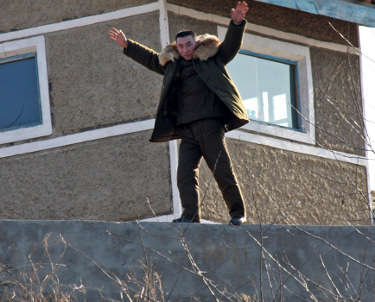Activists Say China Complicit in Suffering of NK Refugees
 Refugees from North Korea and activists are gathering in Seoul, South Korea, this week to highlight human rights violations in the closed communist nation. But their attention is also turning to China, which they say is often complicit in North Koreans’ suffering.
Refugees from North Korea and activists are gathering in Seoul, South Korea, this week to highlight human rights violations in the closed communist nation. But their attention is also turning to China, which they say is often complicit in North Koreans’ suffering.
Non-governmental organizations (NGOs) estimate anywhere from 30,000 to 250,000 refugees from North Korea are living in China, either in border areas or deeper inland. But China remains impervious to the refugees’ plight.
“China fears being flooded by refugees if they show compassion,” said Suzanne Scholte, co-chair of the North Korea Freedom Coalition, which is hosting its seventh-annual North Korea Freedom Week in Seoul through Saturday. “But refugee flows aren’t going to collapse the [North Korean] regime. If that was going to happen, it would have happened already during the famine, so their argument doesn’t hold water.”
(Read “‘Pinpricks’ of Truth Making Way Into North Korea”)
Few refugees are Christians when they emerge from North Korea, but the whispered advice among refugees is to “head for a cross,” signaling a Chinese church that may assist them, according to a February 2009 National Geographic report.
Since China will not allow the United Nations High Commissioner for Refugees access to border areas, Chinese Christians work with Christian NGOs to provide an “underground railroad” moving refugees via several routes to safety, most often in South Korea.
Chun Ki-Won, director of Christian NGO Durihana, admits that some of the refugees adopt Christianity to win favor with their rescuers, but others retain and strengthen their faith on arrival in South Korea.
China insists that the refugees are economic migrants and pays police a bounty to arrest and return them to North Korea. On arrival, North Korean officials pointedly question the refugees about contact with Chinese Christians or Christian NGOs. If any contact is admitted, execution or imprisonment is likely, according to David Hawke’s 2005 report, “A Prison Without Bars.”
As one refugee told Hawke, “Having faith in God is an act of espionage.”
Still others choose to return to North Korea with Bibles and other Christian resources at great risk to themselves. For example, officials in June 2009 publicly executed Ri Hyon-Ok, caught distributing Bibles in Ryongchon, a city near the Chinese border, South Korean activists reported.
Scholte noted that North Koreans don’t want to leave. “They leave because of Kim Jong-Il,” she said. “Those [North Korean refugees] in South Korea want to go back and take freedom with them.”
Two U.S. Christians entered North Korea in recent months with the same goal in mind. Robert Park, an evangelical Christian missionary, crossed the border on Dec. 25 with a letter calling for Kim Jong-Il to resign. Officials immediately arrested Park, according to the regime’s Korean Central News Agency. He was later sentenced to eight years of hard labor but released in late February after making what many experts believe was a forced confession.
Fellow activist Aijalon Mahli Gomes entered North Korea on Jan. 25, the same news agency reported. Officials sentenced Gomes to nine years of hard labor and fined him 70 million new Won ($518,520). At press time Gomes remained in detention.














































